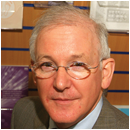Home > Scottish Diabetes Research Network
The Scottish Diabetes Research Network (SDRN) was commissioned in 2006 by the Chief Scientist Office (CSO) of the Scottish Government to improve the quality and increase the quantity of diabetes research in Scotland, as part of the UK Clinical Research Collaboration (UKCRC).
Our aims;
SDRN Executive Group members;
 |
SDRN Lead Clinician Professor Rory McCrimmon trained at the University of Edinburgh and completed his clinical and speciality training in the South-East of Scotland before becoming an NHS Consultant Physician in Diabetes and Endocrinology at University Hospital Aintree, Liverpool, in 2000. In 2002, he joined the faculty at Yale University, Connecticut, to further develop his basic research in the central regulation of glucose homeostasis, before returning to the UK in 2009 to establish his laboratory at the University of Dundee, where he is currently Professor of Experimental Diabetes and Metabolism and Honorary Consultant, and Lead Clinician for the Scottish Diabetes Research Network. Prof McCrimmon’s Laboratory focuses on the basic mechanisms through which the brain regulates whole body glucose homeostasis with a particular focus on hypoglycaemia. His laboratory has made a number of important contributions to this field and the work of has laboratory as been presented at many national and international meetings. In addition to his work in research and clinical practice, Prof McCrimmon serves on the editorial board of the Journal of Clinical Endocrinology and Metabolism and Diabetic Hypoglycemia, an on-line journal focused on hypoglycaemia in clinical practice. He also serves as a member of the Medical Research Council Clinical Fellowship Training and Career Development Awards Panel, the Scottish Translational Medicine Training Initiative, and the Research Advisory board, Diabetes Research & Wellness Foundation. |
 |
Catherine Armstrong lives in Lanarkshire and has had Type 1 Diabetes for over 30 years. She spent virtually all of her working life in education. She joined the Research Register in 2008 and has participated in a number of research studies. In 2011 she became a member of the Diabetes Care Focus Group. |
 |
Alistair Emslie-Smith has been a General Practitioner in a large inner-city Practice in Dundee, Scotland, since 1990. He has day-to-day responsibility for the care of the 350 patients with diabetes in his Practice. He is Lead Clinician of Tayside Diabetes Managed Clinical Network, which co-ordinates integrated diabetes services across NHS Tayside. He has been involved in the DARTS (Diabetes Audit & Research in Tayside, Scotland) project since its inception in 1996. He chairs the Steering Group of the SCI-DC (Scottish Care Information – Diabetes Collaboration) national diabetes ICT programme and sits on the Scottish Diabetes Group. He is a director of The Worldwide Initiative for Diabetes Education (WorldWIDE), an international charitable foundation that seeks to encourage and promote better management and care of people with diabetes through enhancing professional education and providing practical information to improve self-management. He gave the Mary McKinnon Lecture at the Diabetes UK Annual Professional Conference in March 2007. |
 |
Robert Lindsay (Chair of SDRN Epidemiology Group) graduated in Medicine at the University of Edinburgh in 1988 and is a Reader in the BHF Cardiovascular Research Centre (Western Infirmary, University of Glasgow). He completed his PhD in fetal programming in Edinburgh in 1997 and postdoctoral work with the diabetes epidemiology group of the National Institutes of Health in Phoenix, Arizona. His principal research interests are early life and genetic determinants of diabetes with particular interest in diabetes and pregnancy. Current projects a follow up study to the Fetal Insulin and Glycaemia Study (FIGS). The original study examined the effect of a mother’s type 1 diabetes during pregnancy on growth and hormonal axes of her child at birth. The follow up study (funded by the British Heart Foundation) is inviting children born in the original FIGS collaboration to an examination of diabetes risk factors and obesity at age 7. The study will investigate the health of children born to mothers with diabetes and examine the hypothesis that maternal diabetes in utero exerts a “programming” effect to increase the risk of diabetes and obesity in children. Dr Lindsay is also a co-investigator in the Scottish Family Health Study- a multi-centre study examining the genetic basis of common complex disease in the Scottish population. |
 |
Professor Sandra MacRury qualified from Glasgow University and after postgraduate training in various hospitals in the city, which included completing an MD thesis on ‘The association between diabetes complications and blood rheology’, moved to Inverness where she has been a consultant diabetologist and endocrinologist at Raigmore Hospital since 1994. In 2006 she was appointed professor of clinical diabetes in the emerging health faculty at UHI Millennium Institute, Inverness. In addition to clinical commitments in diabetes and endocrinology in Highland region, her academic research interests include the effects of lifestyle and therapeutic agents on inflammatory markers and oxidative stress in diabetes, remote monitoring of diabetes with an emphasis on rural locations and genetic associations between diabetes and diet. She and the Highland diabetes research team have been involved with the SDRN for over 2 years and have participated in several multi centred projects coordinated by the network. She is currently director of the newly established Highland Clinical Research Facility based at the Centre for Health Science in Inverness which hosts research from all medical disciplines and from both clinical and academic institutions within the region. She has been involved in diabetes education for a number of years, helping to develop UHI Millennium Institute’s web based multi disciplinary diabetes modules and chairs Scottish Diabetes Education Advisory Group. She has a particular interest in managing diabetic ketoacidosis and has been instrumental in helping to develop the Scottish Protocol for managing DKA and other patient resources such as an interactive web site and Ketocard. |
 |
Professor John McKnight graduated from Queens University, Belfast in 1983. He trained in Northern Ireland and spent two years as a research fellow at Harvard University. He was appointed Consultant Physician and Honorary Senior Lecturer at the Department of Medicine, Western General Hospital, Edinburgh in 1994. He became Clinical Director in 2000 and Lothian Diabetes Managed Clinical Network Clinical Lead in 2003. He has been chairman of the Scottish Diabetes Survey Monitoring Group for 9 years and was deputy-chairman of the Quality Improvement Scotland Diabetes Standards Sub-group. He chaired the Diabetes SIGN Guideline Committee (SIGN 116 published March 2010). He was appointed Lead Clinician for Diabetes in Scotland and Chairman of the Scottish Diabetes Group in Jaunary 2011. He also chairs the Quality Improvement Scotland National Data for Quality Improvement Advisory Group. He has been awarded a Health Foundation team leadership award and the 2006 Hospital Doctor diabetes team of the year award. He has research interests in prevention of diabetes, vascular disease in diabetes, epidemiology of diabetes and its complications and in remote monitoring of diabetes.Professor John McKnight graduated from Queens University, Belfast in 1983. He trained in Northern Ireland and spent two years as a research fellow at Harvard University. He was appointed Consultant Physician and Honorary Senior Lecturer at the Department of Medicine, Western General Hospital, Edinburgh in 1994. He became Clinical Director in 2000 and Lothian Diabetes Managed Clinical Network Clinical Lead in 2003. He has been chairman of the Scottish Diabetes Survey Monitoring Group for 9 years and was deputy-chairman of the Quality Improvement Scotland Diabetes Standards Sub-group. He chaired the Diabetes SIGN Guideline Committee (SIGN 116 published March 2010). He was appointed Lead Clinician for Diabetes in Scotland and Chairman of the Scottish Diabetes Group in Jaunary 2011. He also chairs the Quality Improvement Scotland National Data for Quality Improvement Advisory Group. He has been awarded a Health Foundation team leadership award and the 2006 Hospital Doctor diabetes team of the year award. He has research interests in prevention of diabetes, vascular disease in diabetes, epidemiology of diabetes and its complications and in remote monitoring of diabetes. |
 |
Professor Donald Pearson is a Consultant Diabetologist and Physician in Aberdeen. After Undergraduate life in Biochemistry and Medicine at Glasgow University, Donald completed his postgraduate training in Glasgow, Inverness and Aberdeen. He was appointed Consultant Physician/Diabetologist in Aberdeen in 1984. Until 2006 he was Lead Clinician for the Diabetes Managed Clinical Network in Grampian and Head of Specialist Diabetes Services working closely with patients and colleagues of all disciplines in the development of integrated diabetes care. Research interests include pregnancy (previous Chair of the Diabetic Pregnancy Study Group of the EASD), diabetes in young people (previous Chairman of the Scottish Study Group for the Care of Diabetes in the Young) and the organisation and development of diabetes services. From 2006 until 2010 he was Lead Clinician for Diabetes in Scotland and Chair of the Scottish Diabetes Group. He was appointed an Honorary Professor with the University of Aberdeen in 2010.Professor Donald Pearson is a Consultant Diabetologist and Physician in Aberdeen. After Undergraduate life in Biochemistry and Medicine at Glasgow University, Donald completed his postgraduate training in Glasgow, Inverness and Aberdeen. He was appointed Consultant Physician/Diabetologist in Aberdeen in 1984. Until 2006 he was Lead Clinician for the Diabetes Managed Clinical Network in Grampian and Head of Specialist Diabetes Services working closely with patients and colleagues of all disciplines in the development of integrated diabetes care. Research interests include pregnancy (previous Chair of the Diabetic Pregnancy Study Group of the EASD), diabetes in young people (previous Chairman of the Scottish Study Group for the Care of Diabetes in the Young) and the organisation and development of diabetes services. From 2006 until 2010 he was Lead Clinician for Diabetes in Scotland and Chair of the Scottish Diabetes Group. He was appointed an Honorary Professor with the University of Aberdeen in 2010. |
 |
Professor John Petrie was appointed Professor of Diabetic Medicine at the University of Glasgow in March 2010 having been Senior Lecturer/Reader in Diabetic Medicine at the University of Dundee since 2003. His Clinical PhD was in Glasgow and was followed by postdoctoral training there as a Clinical Lecturer. From 2006, he led the initiation and development of the Scottish Diabetes Research Network (SDRN) and remains active on the SDRN Steering Group. John currently serves on and/or chairs a number of grant-awarding panels and advisory committees for: the US Juvenile Diabetes Research Foundation, the European EFSD/Pfizer European Programme for Research into Cardiovascular Risk Reduction in Patients with Diabetes, the UK National Institute for Healthcare Research, Diabetes UK, and the NovoNordisk UK Research Foundation. His research aims better to understand the mechanisms of vascular disease associated with insulin resistance in diabetes and thereby to improve health outcomes for people with diabetes (types 1 and 2). This involves intensive phenotyping studies (e.g. euglycaemic clamp), larger scale cohort studies (e.g. RISC of which he is on the small Project Management Board), and biomarker discovery/validation. In December 2010 he was awarded major research funding by the US Juvenile Diabetes Research Foundation for the international REMOVAL trial (of which he is Chief Investigator) which is testing the cardiovascular effects of metformin on the complications of type 1 diabetes over the next five years within the diabetes research networks in Scotland, England, Denmark, Holland, Canada, and Australia. John was a founding member of the International Society of Diabetes and Vascular Disease Research (2004). In 2009-10 he chaired the development of the Scottish Intercollegiate Guidelines Network (SIGN) guidance on glucose-lowering in type 2 diabetes. He is an Associate Editor of the journal of the European Association for the Study of Diabetes journal Diabetologia (Impact Factor 6.5). |
 |
Brian McKinstry is a general practitioner in Edinburgh and Professor of Primary Care eHealth at the University of Edinburgh. He leads the Edinburgh Health Services Research Unit and is Director of the Scottish Health Research Register SHARE. His research interests are mainly around Health Service Research particularly in in how doctors consult with patients. More recently he has been interested in telephone consulting and telehealthcare and has carried out several randomised controlled trials and qualitative studies in this area. These studies include the management of chronic obstructive airways disease, heart failure, high blood pressure and diabetes along with studies of satellite location for wandering people with dementia and developing electronic systems for monitoring depression.
|
